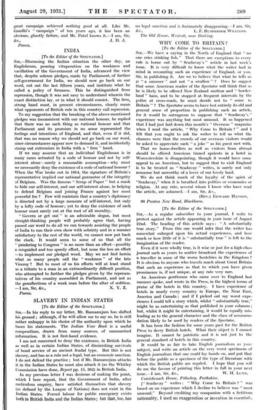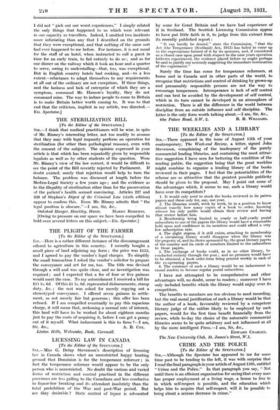[To the Editor of the SPECTATOR.] SIR,—As a regular subscriber
to your journal, I write to protest against the article appearing in your issue of August 22nd. The heading of this article says : "A substantially true story." From this one would infer that the writer has somewhat enlarged upon his actual experiences, and how much or how little of it is " substantially true " is left to the imagination of the reader.
Even if it were wholly true, is it wise or just for a high-class journal such as yours to scatter broadcast the experiences of a traveller in some of the worse hostelries in the Kingdom ? It is obvious to anyone who travels much about Great Britain that such an experience as that to which you have given prominence is, if not unique, at any rate very rare.
An American gentleman who came over to England last summer spoke, and wrote in the Press, in the highest terms of praise of the hotels in this country. I have experience of hoteLs in nearly every country in Europe, the Near East, America and Canada ; and if I picked out my worst expe- riences I could tell a story which, whilst "substantially true," might be as entertaining as that published in your columns ; but, whilst it might be entertaining, it would be equally mis- leading as to the general character and the class of accommo- dation likely to be used by readers of the Spectator.
It has been the fashion for some years past for the British Press to decry British hotels. What their object is I cannot imagine. It cannot be patriotic and it is not just to the general standard of hotels in this country. It would be as fair to take English journalism as your subject, and write an article on the very worst specimens of English journalism that one could lay hands on, and put that before the public as a specimen of the type of literature with which the British public are regaled. I hope that you will do me the favour of printing this letter in full in your next
issue.—I am, Sir, &c., W. H. LuNN. Corriebruach House, Pitlochry, Perthshire.
Scadavay " writes : "Why Come to Britain ? " was based on an experience which I decline to believe was "most unusual." Beyond crediting my companion with a fietitiou, nationality, I used no exaggeration or invention in essentials.
I did not "pick out our worst experiences." I simply related the only things that happened to us which were relevant in our capacity as travellers. Indeed, I omitted two incidents more infuriating than any that I described on the grounds that they were exceptional, and that nothing of the same sort had ever happened to me before. For instance, it is not usual for the staff of an hotel, when instructed to call a guest in time for an early train, to fail entirely to do so ; and as for our dinner on the railway which it took an hour and a quarter to serve, owing to understaffing—that, too, was exceptional. But in English country hotels bad cooking, and—to a less extent—reluctance to adapt themselves to any requirements at all out of the ordinary are not exceptions. If these things, and the laziness and lack of enterprise of which they are a symptom, command Mr. Hanson's loyalty, they do not command mine. The way to induce people to come to Britain is to make Britain better worth coming to. It was to that end that the criticism, implicit in my article, was directed.— ED. Spectator.]



























 Previous page
Previous page